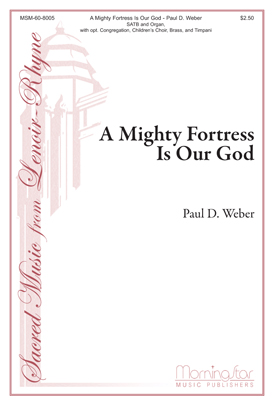- |
User Links
A sure stronghold our God is He
Representative Text
A sure stronghold our God is He,
A trusty shield and weapon;
Our help He'll be and set us free
From ev'ry ill can happen.
That old malicious foe
Means us deadly woe;
Arm'd with might from hell
And deepest craft as well,
On earth is not his fellow.
Through our own force we nothing can,
Straight were we lost for ever;
But for us fights the proper Man,
By God sent to deliver.
Ask ye who this may be?
Jesus Christ is He,
Of Sabaoth Lord,
Sole God to be adored--
'T is He must win the battle.
And were the world with devils fill'd,
All eager to devour us,
Our souls to fear should little yield,
They cannot overpower us.
Their dreaded Prince no more
Harms us as of yore;
Look grim as he may,
Doom'd is his ancient sway,
A word can overthrow him.
Still shall they leave that Word His might,
And yet no thanks shall merit;
Still is He with us in the fight
By His good gifts and Spirit.
E'en should they take our life,
Wealth, name, child, or wife--
Though all these be gone,
Yet nothing have they won,
God's kingdom ours abideth!
Author: Martin Luther
 Luther, Martin, born at Eisleben, Nov. 10, 1483; entered the University of Erfurt, 1501 (B.A. 1502, M.A.. 1503); became an Augustinian monk, 1505; ordained priest, 1507; appointed Professor at the University of Wittenberg, 1508, and in 1512 D.D.; published his 95 Theses, 1517; and burnt the Papal Bull which had condemned them, 1520; attended the Diet of Worms, 1521; translated the Bible into German, 1521-34; and died at Eisleben, Feb. 18, 1546. The details of his life and of his work as a reformer are accessible to English readers in a great variety of forms. Luther had a huge influence on German hymnody.
i. Hymn Books.
1. Ellich cristlich lider Lobgesang un Psalm. Wittenberg, 1524. [Hamburg Library.] This contains 8 German h… Go to person page >
Luther, Martin, born at Eisleben, Nov. 10, 1483; entered the University of Erfurt, 1501 (B.A. 1502, M.A.. 1503); became an Augustinian monk, 1505; ordained priest, 1507; appointed Professor at the University of Wittenberg, 1508, and in 1512 D.D.; published his 95 Theses, 1517; and burnt the Papal Bull which had condemned them, 1520; attended the Diet of Worms, 1521; translated the Bible into German, 1521-34; and died at Eisleben, Feb. 18, 1546. The details of his life and of his work as a reformer are accessible to English readers in a great variety of forms. Luther had a huge influence on German hymnody.
i. Hymn Books.
1. Ellich cristlich lider Lobgesang un Psalm. Wittenberg, 1524. [Hamburg Library.] This contains 8 German h… Go to person page >Translator: Catherine Winkworth
 Catherine Winkworth (b. Holborn, London, England, 1827; d. Monnetier, Savoy, France, 1878) is well known for her English translations of German hymns; her translations were polished and yet remained close to the original. Educated initially by her mother, she lived with relatives in Dresden, Germany, in 1845, where she acquired her knowledge of German and interest in German hymnody. After residing near Manchester until 1862, she moved to Clifton, near Bristol. A pioneer in promoting women's rights, Winkworth put much of her energy into the encouragement of higher education for women. She translated a large number of German hymn texts from hymnals owned by a friend, Baron Bunsen. Though often altered, these translations continue to be used i… Go to person page >
Catherine Winkworth (b. Holborn, London, England, 1827; d. Monnetier, Savoy, France, 1878) is well known for her English translations of German hymns; her translations were polished and yet remained close to the original. Educated initially by her mother, she lived with relatives in Dresden, Germany, in 1845, where she acquired her knowledge of German and interest in German hymnody. After residing near Manchester until 1862, she moved to Clifton, near Bristol. A pioneer in promoting women's rights, Winkworth put much of her energy into the encouragement of higher education for women. She translated a large number of German hymn texts from hymnals owned by a friend, Baron Bunsen. Though often altered, these translations continue to be used i… Go to person page >Text Information
| First Line: | A sure stronghold our God is He |
| German Title: | Ein' feste Burg is unser Gott |
| Author: | Martin Luther (1529) |
| Translator: | Catherine Winkworth (1863) |
| Language: | English |
| Copyright: | Public Domain |
Tune
EIN FESTE BURGThe original rhythms of EIN FESTE BURG (see 469) had already reached their familiar isorhythmic (all equal rhythms) shape by the time of Johann S. Bach (PHH 7) in the eighteenth century. The harmonization is taken from his Cantata 80. Many organ and choral works are based on this chorale, including…


 My Starred Hymns
My Starred Hymns






